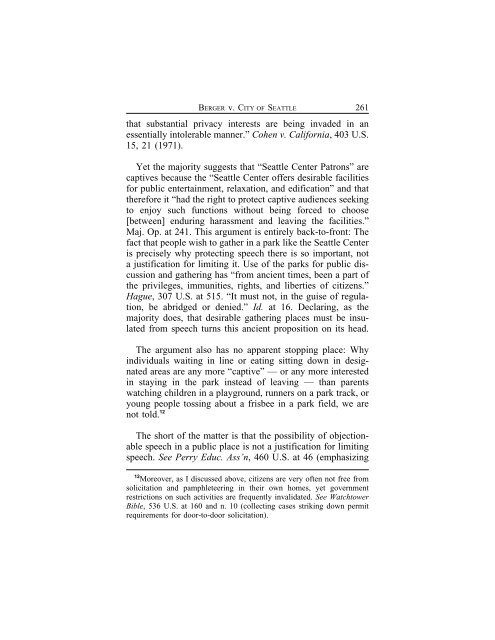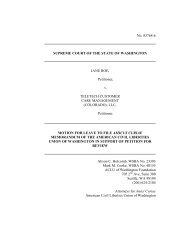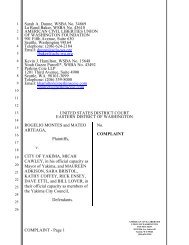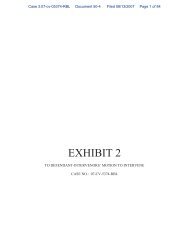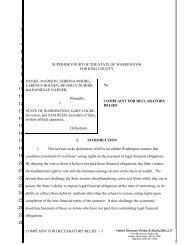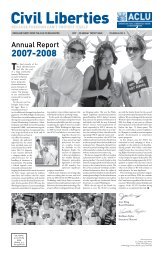BERGER v. CITY OF SEATTLE - ACLU of Washington
BERGER v. CITY OF SEATTLE - ACLU of Washington
BERGER v. CITY OF SEATTLE - ACLU of Washington
Create successful ePaper yourself
Turn your PDF publications into a flip-book with our unique Google optimized e-Paper software.
<strong>BERGER</strong> v. <strong>CITY</strong> <strong>OF</strong> <strong>SEATTLE</strong><br />
261<br />
that substantial privacy interests are being invaded in an<br />
essentially intolerable manner.” Cohen v. California, 403 U.S.<br />
15, 21 (1971).<br />
Yet the majority suggests that “Seattle Center Patrons” are<br />
captives because the “Seattle Center <strong>of</strong>fers desirable facilities<br />
for public entertainment, relaxation, and edification” and that<br />
therefore it “had the right to protect captive audiences seeking<br />
to enjoy such functions without being forced to choose<br />
[between] enduring harassment and leaving the facilities.”<br />
Maj. Op. at 241. This argument is entirely back-to-front: The<br />
fact that people wish to gather in a park like the Seattle Center<br />
is precisely why protecting speech there is so important, not<br />
a justification for limiting it. Use <strong>of</strong> the parks for public discussion<br />
and gathering has “from ancient times, been a part <strong>of</strong><br />
the privileges, immunities, rights, and liberties <strong>of</strong> citizens.”<br />
Hague, 307 U.S. at 515. “It must not, in the guise <strong>of</strong> regulation,<br />
be abridged or denied.” Id. at 16. Declaring, as the<br />
majority does, that desirable gathering places must be insulated<br />
from speech turns this ancient proposition on its head.<br />
The argument also has no apparent stopping place: Why<br />
individuals waiting in line or eating sitting down in designated<br />
areas are any more “captive” — or any more interested<br />
in staying in the park instead <strong>of</strong> leaving — than parents<br />
watching children in a playground, runners on a park track, or<br />
young people tossing about a frisbee in a park field, we are<br />
not told. 12<br />
The short <strong>of</strong> the matter is that the possibility <strong>of</strong> objectionable<br />
speech in a public place is not a justification for limiting<br />
speech. See Perry Educ. Ass’n, 460 U.S. at 46 (emphasizing<br />
12 Moreover, as I discussed above, citizens are very <strong>of</strong>ten not free from<br />
solicitation and pamphleteering in their own homes, yet government<br />
restrictions on such activities are frequently invalidated. See Watchtower<br />
Bible, 536 U.S. at 160 and n. 10 (collecting cases striking down permit<br />
requirements for door-to-door solicitation).


